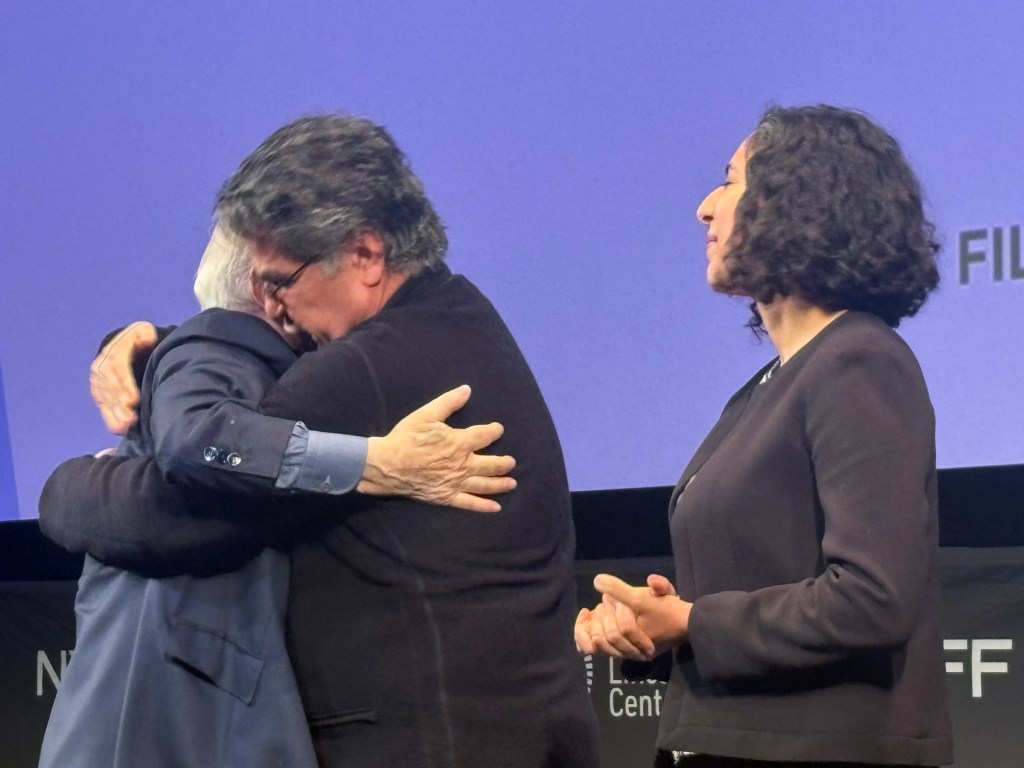The intense mutual admiration of Martin Scorsese and Jafar Panahi was evident today as the American and Iranian directors embraced at length. Panahi bowed to “a god of cinema.” Scorsese challenged streamers to support Iranian filmmakers.
Panahi was in New York for his Cannes Palme d’Or-winning It Was Just An Accident, shot secretly and based on his time in prison. The two sat down for a Q&A rescheduled from last week due to a delay in processing Panahi’s visa. Scorsese asked about the future of Iranian cinema given all the great auteurs who have left the country.
“It was really difficult to bear … All the backbones of Iranian filmmaking are out. I really miss all those films that they could have made in Iran and they never did,” Panahi said through a translator, adding, “I don’t have the courage and I don’t have the ability to leave Iran and stay out of Iran. I have stayed there and I’m going to work there.”
And he stressed that “there are a lot of young filmmakers who are … making the best films of Iranian cinema, in the same style that we are making films” — in secret. “And they are not going to accept censorship whatsoever. It has become so common, that even within … film circles in Iran, everyone is … taking these people seriously. People who make films clandestinely. Whereas there was a time that no one really paid attention.”
“These films would have to be supported,” Scorsese insisted, by distributors, festivals and streamers. “Streaming platforms have a lot of room. And they throw things” [on] … “There’s no reason why, you know, a Criterion, Mubi, and Amazon, all of that, couldn’t show these films.”
His further suggestion: “It’s really getting to see these films, not just putting … them on, what are they called? Tiles? You have to kind of curate them a bit. So you know where you’re going, you know what you’re looking for.”
Panahi, after his release from prison, was warned not to practice his craft. “When they told me that I could not make films for 20 years, or write, or give interviews, or leave Iran for 20 years, I was in shock.” He said he toyed with driving a taxi. Instead, against the odds, he continued to make movies, excellent ones. “When you’re making a film in a situation like that, 50% of your energy and your strength goes into finding the way to … make a film. And you only have 50% left for creativity and for the work itself.”
He believes things are changing in Iran.
“I had made No Bears [2022], but at the screening at Venice, I was in prison. Then we heard that something is happening outside the prison. The Women, Life, Freedom Movement had started. We could sense that it’s something important. but we really did not understand its magnitude. After we finally were released from prison, we saw that the appearance of the city has completely changed. Women resisted very hard in that movement. And they crossed an unimaginable red line. In my opinion, the history of these Islamic Republic is divided into before and after … This had affected everything. Of course it would affect cinema too,” like his actresses refusing to wear headscarves.
In the darkly comic It Was Just An Accident a man, who believes he has found the guard who tortured him in prison, seeks revenge, kidnaps him and begins to bury him alive in the desert. But suddenly doubting that he has the right person, he seeks out former fellow prisoners hoping to confirm the man’s identity. They can’t and tension rises.
“All I want to say in this film is this: elements, such as justice, forgiveness, they’re all there, they’re all in the film, but they’re all there to serve the plot. This film has been made now for the time that we have post-Republic of Iran. We have to think about what happens after. And we have to decide what we’re going to do. Are we going to continue violence? Or at some point … are we going to say cut?”
The post Martin Scorsese Embraces Jafar Panahi, Urges Streamers To Support Iranian Filmmakers – New York Film Festival appeared first on Deadline.




